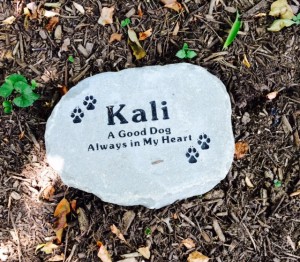May 21, 2015
This morning I put Kali’s ashes to rest under the witch hazel, in the Secret Garden that was one
of Kali’s favorite spots on a hot day. It was gray and raining lightly, but four years ago today
when Kali came to live with me, it was a clear day full of sunshine. I had driven to her foster
home in northern Maryland to pick her up. She was happy to go in the car–I would soon learn
that Kali was always happy to go in the car–and settled down in the backseat while I drove to
Olney to pick up Emma. Emma declared her a “sausage dog” and it was true Kali was
overweight and not the trim Brittany spaniel she would become.
I had read that dogs do not understand that they are traveling distances when going places by
car, and that when introducing a dog to a new home, you should walk the dog there. And so I
parked the car at the turnaround, and the three of us walked the rest of the way, Kali tugging
and straining on the leash. Despite being ten years old, she did not know how to heel or stay or
come. She knew how to sit, though that was hard with her hip dysplasia and arthritis, and she
knew how to pick up a paw on command.
Bringing Kali into my home was one of the best things I could have done. Bill had been dead not
quite a year, and I was emerging out of the fog of the first year of grief into the second year of
mourning, when you realize that there is no magic, he is not coming back, this is how it is going
to be forever. Kali brought me the unconditional love of a sweet dog. I soon learned that Kali’s
one mission in life was keeping track of me. When we were outside as we were much of the
time in good weather, she would wander a bit in the fenced yard, sniffing out chipmunks and
squirrels, but she soon would come bounding back to find me. Now and then she lost me and
would go to the kitchen door and bark, thinking I had gone inside. Then I had to call her, or lay
down my gardening tools and go retrieve her. When I went swimming, she would pace around
the pool anxiously. Most Brittany spaniels like the water, but not Kali.
Inside my small house, Kali stayed close to me, and I bought three beds to keep her old bones
comfortable in the living room, study, and bedroom. The family room was off limits to her, as it
was the cats’ gated refuge, but if I went in there to watch television I would snap on her leash
and hitch her to the ottoman leg: her whining at the gate had worn me down. At bedtime I was
comforted by her gentle snoring on the floor by my bedside, though sometimes I was awakened by
her yipping and her paws scratching against the wall while she pursued a chipmunk in her
dreams.
When I returned home from errands or activities, Kali greeted me at the door, stubby tail
wagging. During her last year, she no longer got off her living room bed to greet me, but simply
raised her head alertly. Now and then I knelt on her bed to rub her belly and cuddle her, with a
doggy smile as my reward.
One morning in January, Kali had great difficulty getting to her feet and then in walking. She
settled on her bed in the study, and although she got to her feet twice, tail wagging hard, she did not
walk. She drank a little water but wanted no food. “Stroke,” said the vet when he came to
the house the next day, and gave her the injection to ease her out of this world, while I cradled
her head and wept. “You’re a good dog, Kali, a very good dog,” I told her.
 And that is what I told her again this morning, while I patted the dirt firmly over the velveteen bag holding her ashes, and the stuffed toy that came with her when I adopted her. And that is what the stone says that marks her resting place: Kali A Good Dog.
And that is what I told her again this morning, while I patted the dirt firmly over the velveteen bag holding her ashes, and the stuffed toy that came with her when I adopted her. And that is what the stone says that marks her resting place: Kali A Good Dog.
 And that is what I told her again this morning, while I patted the dirt firmly over the velveteen bag holding her ashes, and the stuffed toy that came with her when I adopted her. And that is what the stone says that marks her resting place: Kali A Good Dog.
And that is what I told her again this morning, while I patted the dirt firmly over the velveteen bag holding her ashes, and the stuffed toy that came with her when I adopted her. And that is what the stone says that marks her resting place: Kali A Good Dog.